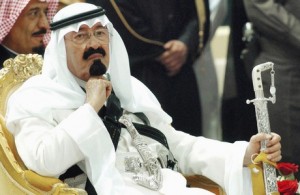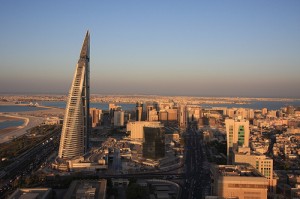On Wednesday morning, King Hamad bin Isa al-Khalifa boarded a plane to pay his respects to King Abdullah of neighboring Saudi Arabia, who had returned home after months abroad for medical treatments.
It was a trip that underscored the extent of Saudi Arabiaâs sway over the teardrop-shaped island off its eastern shore, as well the prospect that the turbulence still whirling in tiny Bahrain could have outsize repercussions in its giant neighbor.
A day after tens of thousands of protesters turned out in Bahrainâs capital, the king is still under pressure from demonstrators who are demanding that he make democratic concessions or step aside. The Shiite-led protesters in Bahrain are demanding that the Sunni royal family grant them equal rights and an equal voice, and majority-Sunni Saudi Arabia is worried that their campaign might give ideas to its own large Shiite minority.
In a sign of its own concerns, the Saudi government announced Wednesday that it will pump $10.7 billion into a fund that gives interest-free loans to citizens and that government workers will receive a 15 percent wage increase, among other measures. Bahrain also gave cash to households just before protests erupted last week.
“Saudi Arabia fears a constitutional monarchy in Bahrain,” said Kristin Smith Diwan, an assistant professor at American University who studies Islamic movements in the Persian Gulf. “Itâs about empowerment of the Shia and what that might mean for Shia in the eastern province” of Saudi Arabia, she said, in addition to fears about Iranâs influence, which she deemed largely unjustified.
“In this current crisis, none of the solutions look good for Saudi Arabia,” Diwan said. “A crackdown in Bahrain would be destabilizing. A reform itself would be destabilizing, unless Saudi Arabia was willing to make some reforms.”
The two countries are taking a cautious stance. Saudi Arabia controls large sectors of Bahrainâs economy, both through outright gifts of oil and through investment in Bahraini banks, businesses and real estate. And its military is just a 16-mile drive away over the King Fahd Causeway, which was built at least in part for precisely that strategic reason, observers say. In a sign of Bahraini fears, rumors constantly swirl on Manamaâs streets about Saudi troop movements and an imminent invasion.
“Although we are friends, the [Bahraini] leadership is afraid of the Saudis,” said one Bahraini observer with close ties to government security officials. “The Bahrainis donât want to do like what happened between Syria and Lebanon. When Syria went into Lebanon, they did not leave.”
Hamad is likely to tell Abdullah that “we still donât need” Saudi military assistance, said the Bahraini observer, who requested anonymity because he was not authorized to speak on behalf of the government. “He will tell them we are coping.”
But Bahrainâs business-friendly, Western orientation - which, unlike in much of the gulf, allows women to walk with bare arms and alcohol to be readily available in restaurants - also serves as an escape valve for Saudis seeking a break from their countryâs stricter rules, analysts said. The Bahraini government has also tried in recent years to clamp down on prostitution, another booming trade on the island.
In recent years, an expanded American military presence has provided a counterweight to Saudi influence. The U.S. Navyâs 5th Fleet is docked just south of Manama, somewhat easing Bahraini fears of a Saudi invasion, Bahraini observers said.
“Bahrainâs survival really depends on two countries, the United States of America and Saudi Arabia,” said Mansoor al-Jamri, a leading Shiite opposition figure who is editor in chief of the independent Bahraini newspaper al-Wasat.
And in the current situation, Jamri said, the possibility of military intervention is unlikely, given the events of last week, when the army and police fired on protesters, killing seven people.
Anti-government demonstrators continued to camp in Manamaâs Pearl Square on Wednesday, their ranks swelled by thousands of people welcoming prisoners whom Hamad had released in a bid to facilitate negotiations.
Among those released were 23 prisoners who had been held since August, accused of plotting to overthrow the king and engaging in terrorist activities. Many of the former detainees alleged that they had been tortured and beaten while in prison.




















